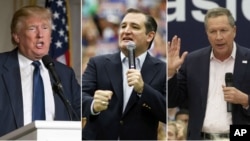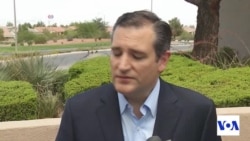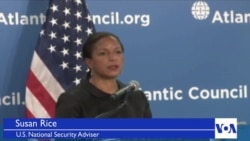U.S. President Barack Obama said the U.S. and Cuba have "half a century of work to catch up on" during a joint press conference with Cuban President Raul Castro Monday.
Earlier in the day, writing in a Facebook post Monday, Obama said he had traveled to Havana to "extend the hand of friendship to the Cuban people" and "bury the last vestige of the Cold War in the Americas."
Obama's message of engagement – which comes a day after excited crowds of Cubans welcomed him to old Havana with chants of "USA! USA!" – stood in sharp contrast to the criticism on social media from Republican presidential candidates.
Republican presidential front-runner Donald Trump tweeted Sunday after Air Force One touched down in Cuba, "Wow, President Obama just landed in Cuba, a big deal, and Raul Castro wasn't even there to greet him. He greeted Pope and others. No respect."
Trump had previously said he was "fine" with the U.S. pursuing a new approach in its Cuba policy.
Cuban-American Republican presidential candidate Ted Cruz, writing in an opinion piece for U.S. political publication Politico Monday, said freedom cannot come to Cuba "by enriching and empowering the dictatorship, while they export terrorism to Latin America."
The Texas senator said his father was tortured by the Batista regime while his aunt was "brutalized by Castro’s thugs" before fleeing to find "freedom in the United States."
Cruz is the remaining Cuban-American candidate in the presidential field after Florida Senator Marco Rubio dropped out of the race last week.
Despite his departure from the race, Rubio has remained vocal in his opposition to the Obama administration's policy, writing in a Facebook post Saturday that the president's arrival in Cuba marked the beginning of "one of the most disgraceful trips ever taken by a U.S. president anywhere in the world."
WATCH: US presidential candidates' views on Cuba
The other remaining Republican presidential candidate, Ohio Governor John Kasich, told MSNBC he wanted to see more balance in the U.S.-Cuba relationship.
"I just think, it's too much we give and they take, and I would like to see them give," Kasich said Friday.
The Republican candidates see U.S. engagement with Cuba as a sign of weakness, but Jason Marczak, director of the Latin America Economic Growth Initiative at the Atlantic Council, said a balanced relationship isn't the purpose of the administration's policy.
"These are one-sided executive actions that the president is taking because in many ways we are empowering or seeking to empower a new economic class in Cuba, which is actually threatening to the Cuban regime."
Human rights concerns
The Senate is in recess this week but reaction from Republican members of the House of Representatives was strong.
Florida Representative Ileana Ros-Lehtinen criticized the president on the House floor Monday, saying he was only "worried about legacy-shopping."
The Cuban-born Lehtinen said Obama's meeting with dissidents was not enough "especially after shaking the hands of a 'murderous tyrant' like Raul Castro," as she put it.
Republican Congressman Mike Pompeo said there was a reason no sitting U.S. president had visited Cuba in almost 90 years, calling the trip a concession to a dictator.
"By visiting Havana, President Obama is giving Fidel Castro a huge public relations coup," Pompeo wrote in an editorial published in the Independent Journal Review Monday.
Analysts said the president's trip may actually increase U.S. leverage on human rights issues in Cuba.
"I can't imagine how being physically present and conveying your values and your interests to the Cuban government and the Cuban people loses leverage," said Tomas Bilbao, managing director at Avila Strategies and a senior associate in the Americas Program at the Center for Strategic & International Studies.
"I'd be curious to know what leverage they thought we had before when we had a half century of a failed policy of isolation that did nothing to bring up changes in Cuba," he said.
Congressional reactions
Other Republicans seem to be warming to the idea of improving ties with Cuba, citing potential business opportunities as a way of opening up freedoms for the Cuban people.
At least 15 Senate Republicans publicly backed a loosening of restrictions on Cuban travel and trade in recent months as the administration pursued the restoration of diplomatic relations.
Analyst Marczak said there's bipartisan movement among many members of Congress to end the embargo but the timing may be difficult.
"it's very problematic to make such a sweeping policy change in Congress in an election year when Congress is just focused right now on keeping the lights on," he said.
Thirty-nine members of Congress joined the president's delegation to Cuba, including five Republicans.
Arizona Senator Jeff Flake – one of the Republicans joining Obama in Cuba – told VOA before his departure, "It’s always bothered me that, as Republicans, we talk about engagement and travel and commerce as something that will nudge countries toward democracy; but, with Cuba, we tend to say, 'No, no, it won’t work there,' but, it will work. It is working."
House Minority Leader Nancy Pelosi, who is the part of the president's delegation, retweeted a message of support from a fellow Democrat Monday.
Democratic Congressman Gregory Meeks, who is one of the members of the president's delegation in Cuba, told MSNBC during an interview in Havana the trip was "a dream that is becoming a reality, that we’re finally talking to one another and having people to people contact.”
Democratic presidential candidates Bernie Sanders and Hillary Clinton have both said they support U.S. engagement with Cuba.
The Vermont senator tweeted Monday, applauding the president for "moving relations between our two countries into a new era."
WATCH: Congressional views on President Obama's Cuba policy







